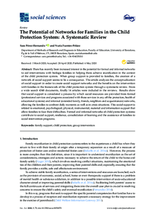Displaying 251 - 260 of 956
This guidance from Miracle Foundation outlines case management process and tools aimed at children in Child Care Institutions (CCIs) in India who have been placed with their families during the COVID-19 pandemic. The purpose of these case management processes and tools is to determine feasibility of permanent placement and expedite family-based care in families in which children were placed quickly and without proper preparation during COVID-19 lockdown.
In this video, care professionals and care leavers describe their experiences of participating in the Prepare for Leaving Care Training, co-developed and co-delivered by young people with care experience.
Based on the resilience theory, which highlights the role of one’s social resources in fostering resilience, the current study explored the role of care leavers' formal and informal social networks during the transition to adulthood, from the point of view of 50 young adults and their social workers.
The purpose of this study was to evaluate the consequences of criminal justice–related prenatal substance use policies for family reunification and to examine differences in parental reunification by racial/ethnic group.
This paper examines the frequency with which transition-age foster youth receive asset building services and whether the youth who receive services experience improved outcomes compared to those who do not.
There has recently been increased interest in the potential for formal and informal networks to aid interventions with biological families in helping them achieve reunification in the context of the child protection system. This article analyzes the conceptualization of social support in order to create social support networks.
The Organizational Governance and Accountability Checklist is designed to help determine whether an organisation providing residential care services, and the principal donor (where the principal donor represents an entity), have sufficient governance and accountability structures in place to mitigate, manage and address risks or issues that may arise in the course of transitioning the model of care.
This study used content analysis to explore: “What are the post-care housing experiences of youth who have transitioned from care through an independent support program?”
This study uses a representative sample of foster youth to investigate youth-level and county-level predictors of youths’ roles in their transitional independent living plan (TILP) development and satisfaction with the care decision meetings.
This article outlines key research on how motivational interviewing is an approach that strengthens positive youth development and can improve youth’s engagement in skills, resources, and services as they age out of foster care.



